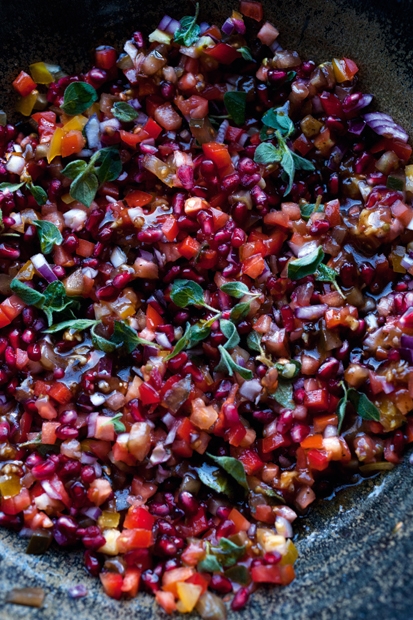It would be a mistake to treat Plenty More, the new cookbook by Yotam Ottolenghi, merely as a collection of recipes. It is a collection of recipes, as it happens, and very good ones, but it’s more the epitome of a world view, a way of life, a vision of contemporary Britain. This is a collection of the great man’s latest vegetarian recipes from the Guardian magazine — I see some of my readers slipping from me as I write — and the mag accompanied the book’s serialisation with a picture of Yotam in the guise of a Renaissance artist, or prince.
But really, the recipes are secondary to the man, who is pretty well the incarnation of the character of contemporary Britain. In Ottolenghiland, za’atar and sumac long ago replaced Lea & Perrins as the condiment of choice, and pomegranate molasses is the new mustard. Quite how you feel about this depends on how you look at the transformation of contemporary Britain by the arrival of lots of people from other parts of the world; this would not, perhaps, be Nigel Farage’s cookbook of choice. Oh all right, that’s a caricature — there are any number of exotic elements in traditional British/ Irish cooking — but as I say, this is a world in which you know not just how to pronounce quinoa but how to make porridge out of it.
Ottolenghi’s godlike status extends way beyond his capacity to make the Waitrose classes buy stuff they’ve never heard of, and to liberate vegetables from their former, second-fiddle status to full-on sex symbols. He’s the Saatchi brothers of vegetable PR. He’s been named as the 19th most influential Jewish person in the Jewish Chronicle power list and, believe me, they slipped up in putting him below Ed Miliband.
He has not only put Middle Eastern flavours centre stage in the kitchens of Islington and Shoreditch, he has, while he’s at it, done his bit for the peace process. His first cookbook was written with his colleague Sami Tamimi who is also gay, and from Jerusalem, but is Muslim; in their book on Jerusalem’s food he suggested, sensibly, that the place should be an international protectorate. He’s not only gay; he’s got a little boy with his partner, Karl — Emma Freud’s gushing interview with him after the event on Radio 4’s Loose Ends tells you lots about the contemporary establishment — and he has suggested, after paying a surrogate, that the UK laws on surrogacy should be loosened.
Not just a chef, then. But as cookbook writer and restaurateur he has unquestionably broadened the palate of lots of Britons. It’s not just that his ingredients are Middle Eastern; in the first book they were Middle Eastern crossed with California — think maple syrup as well as coriander — and here they range further afield. He takes in Burma and Japan as well as Iran. The ingredients reflect his global range; in the first few chapters I noted buna shimeja mushrooms, umeboshi puree and freekah; he declares that he has added to his favourites ‘kashk, dakos and black garlic’. Mock, reader, but when you find your local supermarket stocking pomelos, you’ll know who to thank.
All very well, you say, but how does the stuff actually taste? Well, his are big, bold flavours. He sums up his philosophy of food as looking for ‘drama in the mouth’. And he does deliver. I’ve just made his cauliflower cake, with a batter of eggs with turmeric and basil, and it’s very good. As he observes there’s a veritable Ottolenghi industry in Camden, where his team tests new combinations.
There’s a lot to like but I’d honestly be happier if I thought that the Ottolenghi groupies had a grounding in the native culinary tradition before haring off to candy beetroot and roast lemons. I’d like to think they’ve tried Jane Grigson and Elizabeth David before going completely global. Returning to British/Irish traditional cooking after Ottolenghi is a bit like looking at a quiet palette of colour after painting your house hot pink and orange.
As I say, Ottolenghi is a view of the world, not to mention a website of
unpronounceable ingredients. This is food as politics.
Available from the Spectator Bookshop, £24, Tel: 08430 600033







Comments